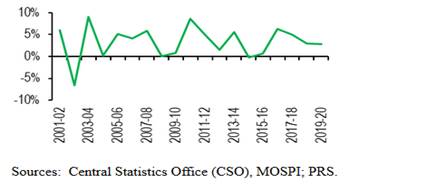Indian Agriculture sector had reported 3.4% growth in Q1Fy21 despite steep GDP contraction. Robust rabi crops harvest, new farm bills and better than expected rainfall has put the sector in limelight. The Central Government of India had passed 3 farm bills in Rajya Sabha, the implication and benefits of the 3 farm bills on Indian Economy are as follows:
Implication on Economy:
· Higher agricultural output would boost country’s GDP growth.
· Higher growth will attract fresh FII flows into the country.
· Higher per capita income in rural India would push rural economy growth.
· Higher employment creation in sectors which are directly/indirectly linked to agriculture sector growth.
· States to lose revenues, as APMC taxes fall
· Big buyers can work in cartels and fix lower prices
Positive Factors:
· Allowing farmers to sell directly in any market will lead to better price realisations thereby increasing income for farmers.
· Higher purchasing power in rural economy would have positive impact on Agro-Chemical industry, FMCG, Auto (2-Wheeler) and Retail sector.
· Selling the crops outside the local territory will be a beneficial as another marketing channel for farmers.
· Private investments would provide better technologies to farmers to improve the crop yield.
· Contract farming for farmers would shield them from volatile market prices.
· Data from the states such as Chhattisgarh and Odisha have shown rise in procurement over last five years after initiation of decentralised procurement.
Negative Factor:
· New bills prohibit State governments from collecting market fee, cess or levy for trade outside the APMC markets. Punjab &Haryana states are most invested in mandis network (APMC system) and earn huge chunk of revenues through mandi taxes.
· Allowing private investments could lead to cartelisation of agricultural products.
· Transportation & storage costs will increase for the farmers who are willing to sell harvested crops in other states.
New Farms Rules
The government of India (GoI) passed three farm bills during monsoon sessions. These bills have been given in Lok Sabha & Rajya Sabha to provide farmers with better prices for crops, more choices of selling marketplace, improving infrastructure, and increasing private investment in agricultural space. However, the farmers communities in Punjab & Hariyana have protested against the bills as they’re feared about removing Minimum Support Price (MSPs) for crops by the government. Following are the three bills which have been passed by the GoI:
· The Farmers Produce Trade and Commerce (Promotion and Facilitation) Bill, 2020, allows farmers to sell their harvest outside the notified Agricultural Produce Market Committee (APMC) mandis without paying any State taxes or fees.
· The Farmers (Empowerment and Protection) Agreement on Price Assurance and Farm Services Bill, 2020, facilitates contract farming and direct marketing.
· The Essential Commodities (Amendment) Bill, 2020, deregulates the production, storage, movement, and sale of several major foodstuffs, including cereals, pulses, edible oils, and onion, except in the case of extraordinary circumstances.
The GoI has mentioned that MSP will be continued despite the implementation of new farm bills and other key initiatives which are still undertaken by the government are:
· Double farmers' income by 2022 through an increase in Minimum Support Price (MSP).
· Government had created a fund for rural employment under Mahatma Gandhi National Rural Employment Guarantee Act (MNREGA).
· Assured income support to marginal and small farmers, the Government announced the Pradhan Mantri Kisan Samman Nidhi (PM-KISAN) scheme.
· Agriculture Export Policy approved by Government of India in December 2018. The new policy aims to increase India's agricultural exports to USD 60 billion by 2022 and USD 100 billion in the next few years with a stable trade policy regime.
Giving farmers the choice to sell without the help of middlemen will be of great use only if there are roads that link villages to markets, climate-controlled storage facilities, the electricity supply is made reliable and available to power those facilities, and food processing companies who compete to buy their produce.

